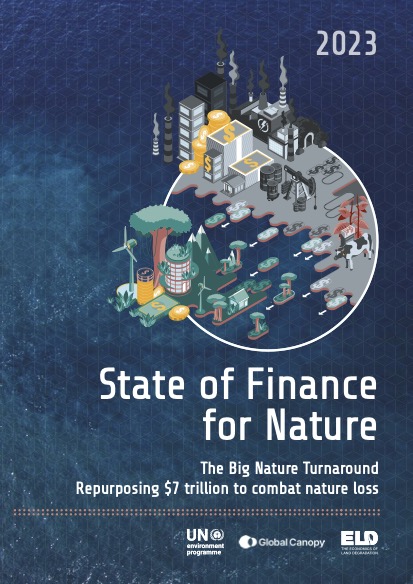State of Finance for Nature 2023 (SFN) Report
The State of Finance for Nature 2023 (SFN) report series tracks finance flows to naturebased solutions (NbS) and compares them to the investment needed to maximise the potential of NbS to help tackle climate, biodiversity and
degradation challenges.

For the first time,The State of Finance for Nature (SFN) 2023 report this edition estimates the scale of nature-negative finance flows from both public and private sector sources globally. The figure is daunting – almost US$7 trillion per year – and is likely to be an underestimate given it includes only direct impacts.
Private finance flows that have a direct negative impact on nature are US$5 trillion, which is 140 times larger than private investments into nature-based solutions (NbS).
The report also reveals that countries invest about $7 trillion annually in subsidies and private investments that negatively impact nature.
This is equivalent to about 7% of the global Gross Domestic Product (GDP). The investments flow into activities such as: Fossil fuels, Agriculture, Construction.
The report also notes that only 17% of total investments in NbS are currently from private finance.
Key Findings of The State of Finance for Nature 2023 (SFN) Report
- Current finance flows to NbS: Around US$200 billion which is only one third of NbS finance needed by 2030.
- Nature-negative finance flows: Estimated at almost US$7 trillion per year.
♦ Nature-negative financial flows refer to finance flows for activities that could potentially have a negative effect on nature.
Like fossil fuel subsidies. - Future investment needs: To meet Rio Convention targets finance flows to NbS must almost triple from current levels to reach US$542 billion per year by 2030.
Recommendations of The State of Finance for Nature 2023 (SFN) report
- Greening finance: Reducing public and private nature-negative finance flows.
- Financing green: Scaling public funding and private investment into NbS.
♦ Like create non-traditional revenue streams, for example, biodiversity and carbon credits. - Green and inclusive financial systems: Ensuring a just transition to a green and inclusive financial system for vulnerable groups, women and Indigenous Peoples.
About Nature based Solutions (NbS)
NbS are actions to protect, sustainably manage, and restore natural and modified ecosystems that address societal challenges effectively and adaptively, simultaneously benefiting people and nature.
Examples of NbS are Reforestation and Afforestation, Wetland Restoration, Green Infrastructure etc.
ABOUT UNEP
- Fostering climate stability
- Living in harmony with nature
- Creating a pollution-free future
- Strengthening environmental standards and practices
- Helping implement environmental obligations at the country, regional, and global levels
- Monitoring the state of the environment
- Informing policy making with science
- Promoting sustainable development and prudent use of the global environment
- United Nations Environment Programme Finance Initiative
- United Nations REDD Programme
- World Conservation Monitoring Centre
- World Refrigeration Day
- Global plastic pollution treaty
- Reset Earth
